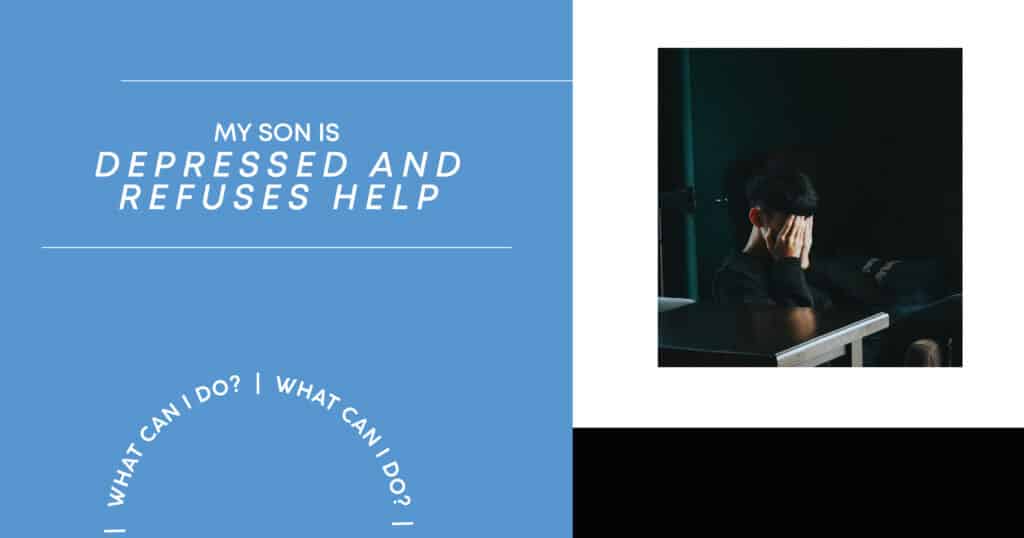You’re sitting across from your son, maybe at the table or in the car, trying to reach him, but he barely nods, barely speaks. Just a little while ago, he was joking around, full of life, all energy and curiosity. Now? He’s distant. Dull. Doesn’t eat right. Snaps at the smallest things. And it’s scary.
You’ve tried different ways, soft conversations, firm talks, even silence, but nothing breaks through. He brushes you off. You’re left wondering, What happened? Why won’t he take the help you’re offering?
If any of this feels painfully familiar, you’re far from alone. It’s a gut-wrenching place for any parent to be. But there’s hope. There are things you can do. Even if your son is depressed and refuses help, you can gently guide him back toward healing. Let’s walk through it together.
Recognizing the Signs of Severe Depression in Teen Boys
Boys often hide emotional pain differently. They’re trained not to talk about feelings, right? They laugh things off, act normal, or even get aggressive. So the signs can sneak up on you. But they’re there if you look closely:
- Withdrawing from social activities. Stops hanging out with friends or ditching family time completely.
- Mood swings or irritability. One second he’s fine, the next he’s lashing out or clearly agitated.
- Physical symptoms. Complaints about constant headaches, stomach issues, or feeling drained.
- Changes in sleep habits. Either sleeping the day away or barely sleeping at all.
- Poor academic performance. Grades tanking, not turning in work, skipping classes altogether.
- Expressions of hopelessness. Says things like “What’s the point?” or “Nothing matters anyway.”
- Engaging in risky behaviors. Messing with drugs, reckless driving, or dangerous stunts.
If a few of these stick around for more than two weeks? It’s probably more than just “a phase.” That’s when it’s time to act, even if he won’t talk about it yet.
What Causes Depression in Teenage Boys?
Depression doesn’t just show up out of nowhere. There’s usually a mix of things building under the surface. And let’s be honest, most teenage boys can’t explain what they’re feeling. They just know something’s wrong.
It might be school drama. Failing grades. A breakup. Feeling lost in their own skin. Sometimes it’s family tension. Or hormones, because puberty takes a toll on mental health, too. And sometimes there’s a deeper root, like a family history of mental illness. That might be the leading cause if everything on the outside looks “fine.”
Brushing it off as just mood swings misses what could be serious pain. So here’s a quick look at some common triggers:
| Cause | What It Might Look Like |
| Family history of depression | Depression, anxiety, or emotional struggles in relatives |
| Hormonal Changes | Huge emotional shifts, sudden tears, or unexplained anger |
| School or friend pressure | Anxiety over grades, trying to fit in, and being overwhelmed by social life |
| Big life events or trauma | Grieving, dealing with divorce, being bullied, or school changes |
| Struggles with confidence | Feels “less than” or like he’s always falling short |
Every teen is different. But the more you understand what’s behind it, the better you can figure out how to step in with compassion – and the right tools.
Why Teens Avoid Therapy – And How to Break the Stigma
Let’s talk about the elephant in the room. Your teenager is depressed, but he wants nothing to do with therapy. It’s not that he doesn’t want to feel better. Here’s why he might be saying “no” to therapy right now:
- He doesn’t know how to express it. Emotions feel like a foreign language to him. He might not even have the words for what’s happening in his head.
- He’s afraid of looking “weak.” Society tells boys not to cry. Not to feel. Definitely not to talk about those feelings. So now he’s stuck thinking that getting help is somehow shameful.
- He’s scared of judgment. Afraid others, maybe even you, won’t get it. That he’ll be seen as broken or dramatic. So instead, he hides.
But let’s be super clear about this: Asking for help doesn’t mean weakness. Not even close. It means strength. That’s a truth he needs to see and feel, and it starts at home.
How to Break the Stigma and Encourage Therapy
So, what now? If your teenager is depressed but terrified of therapy, how can you even begin to nudge him in that direction?
You have to normalize it. Make therapy feel like another tool. Make sure he knows it’s not weird, and neither is it shameful. It’s just something that helps.
Here’s how you can shift the vibe at home and open the door without forcing it:
| Tip | How it Works |
| Normalize mental health | Talk about stress, emotions, even your own mental health openly, and casually. |
| Reframe therapy as a tool | Say things like, “It’s just support. Like a coach for your brain?” |
| Provide options | Give him choices: private therapy, group settings, virtual sessions, let him pick. |
| Respect his autonomy | Don’t trap him. Don’t ambush him. Let him feel like he’s deciding |
The shift won’t happen overnight. But keep at it. Keep the tone relaxed. Celebrate small steps, like him just reading an article about depression or watching a video on mental health.
And when he’s ready? Therapy will feel a little less scary. And a little more doable.
The Role of Family Support in Depression Recovery
This part’s tough. You’re trying so hard, and it still feels like you’re being kept at arm’s length. Maybe even pushed away. But don’t let that fool you, your presence matters more than it seems.
When your son is depressed and refuses help, it’s tempting to either back off completely or push harder. Neither works.
What does work? Gentle consistency. Keep showing up. Not with big speeches. Just quiet reliability. A ride to school. His favorite snack on the counter. Watching TV beside him without talking.
It’s these tiny acts that build trust again. You’re showing him, without words, “I’m not giving up on you.”
Being Present Without Pushing
Trying to help a teen who won’t let you in is exhausting. So what can you do?
- Sit with him. Just exist in the same space. Don’t push conversation. Let it come naturally if it does at all.
- Celebrate small wins. Celebrate every step they take out of their comfort zone.
- Use quiet encouragement. Notes. Texts. Casual mentions. Not lectures.
- Make home feel safe. Even if he’s fighting everything, home should be a soft landing place. No judgment. Just warmth.
When it comes to teens and depression, the magic isn’t in some one-time “fix.” It’s in slow, steady love. Love that waits. Love that listens.
Can Depression Improve Without Professional Help?
You might be wondering: What if this passes on its own? Maybe it’s just hormones or school stress?
Sometimes that’s true. Light, short-term dips in mood can lift on their own, especially when caused by things like breakups or academic pressure. But if your teenager is depressed for weeks or months?
Waiting might not cut it. In fact, it might make things worse. That’s where teenage depression treatment comes in. This could mean therapy. Sometimes medication. Often both.
Feeling Stuck? Hillside Horizon for Teens Offers a Path Forward
If you’ve read this far, you might be thinking: “This sounds like my son.” You’re not imagining it. You’re not failing. You’re just in a situation no one prepared you for. And you don’t have to figure it out alone.
My son is depressed and refuses help – that’s the exact scenario we’ve seen countless times at Hillside Horizon for Teens. Families like yours. Teens just like your son.
We offer specialized support for helping a teenager with anxiety and depression, including:
- Customized treatment plans that they can actually get on board with
- Counseling for parents
- Virtual or in-person sessions
- Guidance on cracking open tough conversations
Our team understands the weird mix of fear, love, and confusion that comes with parenting a teen in pain. We’re not here to fix everything overnight. We’re here to help you breathe again and give your son the shot at healing he deserves.
Contact Hillside Horizon for Teens today to get your son the help he needs.
FAQs
How do I help my depressed son who refuses help?
Start simple. Be around and be kind. Don’t nag, but don’t vanish either. Let him know you care, without piling on pressure.
What are the signs of severe depression in teens?
You’ll notice major mood changes, sleeping way too much, or barely at all. Maybe they’ve stopped eating regularly, lost interest in friends, or hobbies.
How can I encourage my teen to seek therapy?
Don’t make it a big deal. Keep talking about mental health casually, in everyday life. Share stories from others (TV shows, podcasts, your own experience). Mention therapy like it’s totally normal.
Can depression go away without treatment?
Sometimes, yes. If it’s mild and tied to short-term situations like stress or hormones. But if your teenager is depressed for weeks on end, don’t wait it out.
What role does family support play in teen depression recovery?
It’s huge. Even if teens act like they don’t want you around, deep down? Your steady love creates safety. Especially when you’re trying to figure out how to help a teenager with anxiety and depression, your presence matters. A lot.




